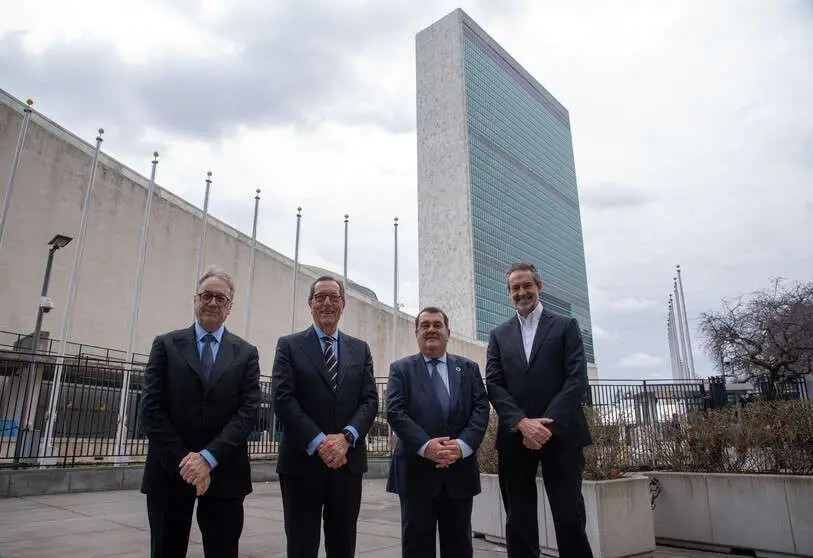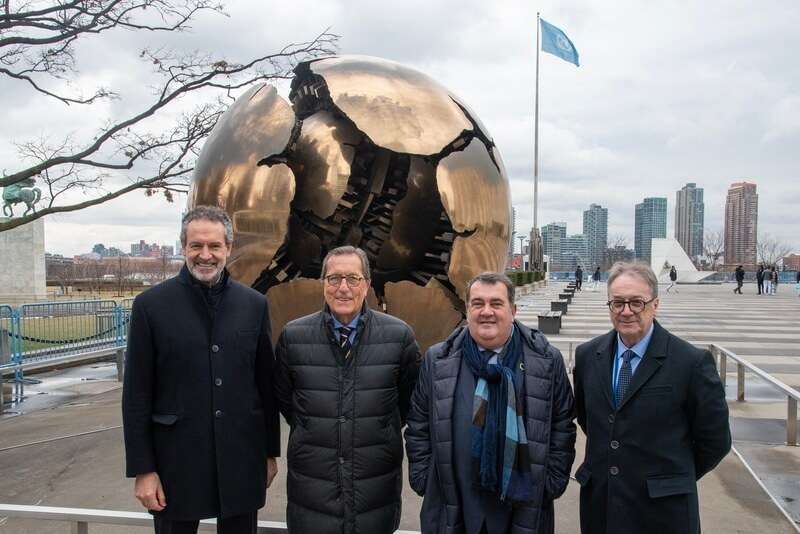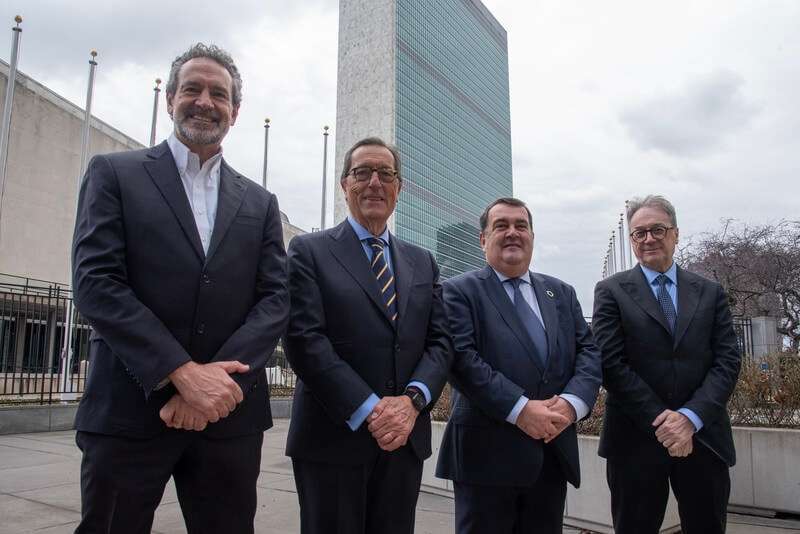The "la Caixa" Foundation presents its CaixaProinfancia programme to the UN, a pioneer in the fight against child poverty in Spain

The "la Caixa" Foundation, as a consultative entity of the Economic and Social Council of the United Nations (ECOSOC), presented the CaixaProinfancia programme, a pioneering model of social intervention set up to respond to the situation of child poverty in Spain. The High Commissioner against Child Poverty of the Spanish Government and Save the Children Spain, with whom the organisation works to develop the programme, also took part in the presentation, highlighting the effectiveness and importance of public-private collaboration, which involves public administrations and organisations working in the field of childhood.
The director general of the "la Caixa" Foundation, Antonio Vila Bertrán, and the deputy director general of the same organisation, Marc Simón, presented the CaixaProinfancia programme, which has been running since 2007 in the main cities of Spain and annually assists more than 61,500 children and adolescents aged between 0 and 18 and more than 38,000 families. With an innovative intervention model based on networking and consolidated over more than 15 years of experience in vulnerable environments, it relies on the collaboration of more than 400 social entities that are responsible for directly assisting families, prioritising aid and monitoring each case. The programme operates in 128 towns and is present in all the provinces of Spain.
CaixaProinfancia seeks to break the line of transmission of poverty from parents to children and to promote equal opportunities. The programme is aimed at children and adolescents in situations of economic poverty and social vulnerability, with the aim of promoting and supporting their development in a comprehensive and personalised way, favouring and supporting policies to improve equity and social cohesion.
Through a methodology and contrasted results, the programme has confirmed that the participants graduate at the end of ESO at similar levels to the rest of the population, 81.4% of the total. Within the same social stratum of CaixaProinfancia children, the percentage of graduates is 48.8%. In low socio-economic contexts, the Spanish average of early ESO dropouts is close to 30 %, while only 4 % of the programme's participants leave secondary school.
In addition, 76% of participants improve their school performance, and 65.6% make progress in the acquisition and development of skills: communication and language, logical-mathematical and social skills. For families, it also means progress: in 78% of cases, there is an increase in homework monitoring, attendance, involvement and participation of parents in school. Of the total, 49% of families are single-parent families. It should be noted that 71.1 % of guardians have no education or at most primary education, and 59.6 % are unemployed.

For their part, the Spanish Government's High Commissioner for Child Poverty, Ernesto Gasco, and the Director General of Save the Children Spain, Andrés Conde, gave an overview of the situation of child poverty in our country. The risk of poverty and exclusion rate affects 28.9% of children in Spain. In total, more than 2.4 million children are in a situation of poverty.
The NGO also states, in its recent report La garantía infantil a examen, that one third of the families it serves live on 100 euros per month per person, and almost 5 % have no income at all. 64% of the children live in families surviving on an average monthly income of less than 1,000 euros, and nearly half of the parents are unemployed.
"Public-private partnerships and networking have proven to be very effective in improving inclusion and breaking the intergenerational transmission of poverty, which is a major challenge for Spanish society. When schools, social services and social organisations work together, the impact of socio-educational action is multiplied", emphasised the general director of the "la Caixa" Foundation, Antonio Vila Bertrán.
Along these lines, the deputy director general of the organisation, Marc Simón, added that "the CaixaProinfancia programme proposes a highly relevant social innovation, due to its community focus, which strengthens the territory, deploying a common, shared and evaluated methodology, and because it promotes empowerment for inclusion and the elimination of stigmas, and connects families with their environment".
In his speech, the High Commissioner for Child Poverty, Ernesto Gasco, said: "The "la Caixa" Foundation is a strategic ally in the Country Alliance for Zero Child Poverty, launched by the High Commissioner. It is a pleasure to participate in the recognition of its CaixaProinfancia programme at the UN, a programme that is a benchmark in the fight against child poverty in Spain".
"A child living in poverty today in a country like Spain has a deficient diet and does his homework with his coat on at home because his family cannot keep it at the right temperature. Nor can he go to the dentist or the psychologist, or wear glasses, even if he needs them. It is a domestic reality, not always visible, but one that weighs down the future of a country. And we cannot allow more than two million children to live in poverty in our country", says Andrés Conde, Director General of Save the Children Spain.
One of the fundamental objectives of CaixaProinfancia is to guarantee the socio-educational promotion of children, on the understanding that their future wellbeing will depend to a large extent on this. This is achieved through the development of five main lines of work:
- Educational reinforcement: speech therapy and psychomotor care, assisted study groups, individual reinforcement, open classrooms and aid for school equipment.
- Leisure and free time: open centres, camps and summer activities.
- Family educational support: family educational workshops, mother-child centre and comprehensive care for mothers, daughters and sons who are victims of gender violence.
- Personal and family psychotherapeutic care: personal or with families and group therapeutic workshops.
- Health promotion: food and hygiene aid for children, glasses and hearing aids.
CaixaProinfancia not only promotes networking between social organisations. The project also promotes coordinated action with other agents in the area (town councils, schools and health centres, among others) to provide a global and comprehensive response to the needs of children and adolescents and their families. Therefore, the assessment of each case, the work plan with specific objectives, the monitoring and evaluation of the same are carried out jointly by the parties involved.
All these organisations act on the premise that the young people of today are the adults who will form the society of tomorrow, and therefore attention to children is a determining factor in achieving their wellbeing, but also in building a fairer, more equitable and cohesive society.

Under the main theme of ECOSOC 2023 and the High Level Political Forum on Sustainable Development (HLPF), "Accelerating recovery from coronavirus disease (COVID-19) and full implementation of the 2030 Agenda for Sustainable Development at all levels", the ECOSOC 2023 Partnerships Forum has brought together UN Member States and stakeholders (from civil society, the private sector, the scientific community, women, youth, local governments and many others) to discuss innovative efforts that are driving action on the UN Sustainable Development Goals (SDGs) and highlight the contributions that partnerships can make in this regard.
ECOSOC, the main body for the coordination of the UN's economic, social and environmental work, granted the "la Caixa" Foundation special consultative status in 2022. This is the highest level offered by the UN to non-governmental organisations, allowing the Foundation to participate in the organisation's work, be heard and contribute to its agenda. The Foundation took part in the 2022 ECOSOC Partnership Forum, where it presented the "la Caixa" Foundation's child vaccination programme, in collaboration with Gavi, The Vaccine Alliance, ISGlobal and IESE; and in the 60th session of the UN Commission for Social Development, where it presented the "la Caixa" Foundation's Work4Progress employment generation programme, which the Foundation is promoting in India, Mozambique and Peru.
At present, 5,003 non-governmental organisations around the world have special consultative status with the UN, of which 217 are foundations.
Giving opportunities to the people who need them most, with the aim of contributing to the construction of a fairer and more equitable society. This is the raison d'être of the "la Caixa" Foundation, created in 1904 and which currently has a budget of more than 500 million euros a year. This makes it the leading private foundation in Spain and one of the most important at international level.
The priority of the "la Caixa" Foundation is the development of social programmes that respond to the great challenges of our time, such as the fight against child poverty, the promotion of employment among groups with difficulties, care for people with advanced illnesses and the promotion of active and healthy ageing. Medical research, training of excellence, culture and education, fundamental to promoting progress and equal opportunities, are other strategic lines of action of the Foundation.








